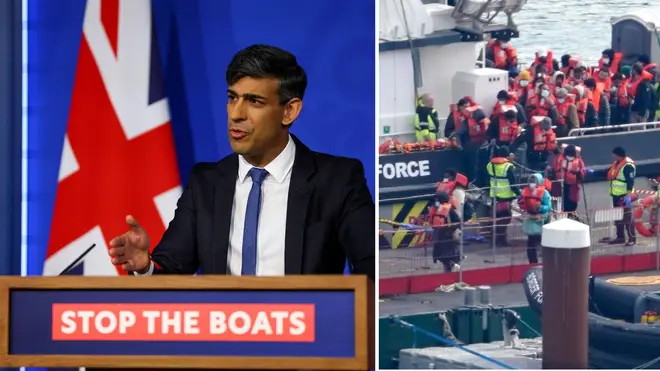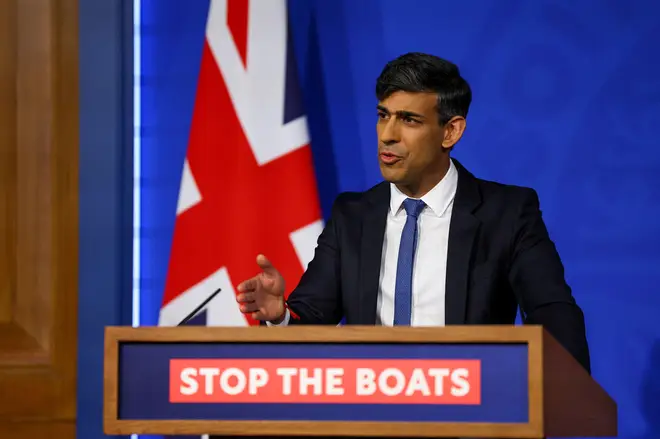
Nick Abbot 10pm - 1am
22 April 2024, 10:48 | Updated: 22 April 2024, 11:11

Rishi Sunak has said the first deportation flights to Rwanda will leave "in 10 to 12 weeks", hours before MPs are due to vote on his emergency legislation.
The Prime Minister told reporters that the government has "an airfield on standby and booked commercial charter planes".
"No ifs, not buts, these flights are going to Rwanda," the prime minister said.
He indicated that once the programme in up and running the planes there will be a "regular rhythm" of flights heading to Kigali.
Mr Sunak said today: "Enough is enough. No more prevarication, no more delay. Parliament will sit there tonight and vote no matter how late it goes. No ifs, no buts. These flights are going to Rwanda.

"Describing the plan as an 'indispensable deterrent so that we finally break the business model of the criminal gangs and save lives.
"Starting from the moment that the Bill passes, we will begin the process of removing those identified for the first flight. We have prepared for this moment."
Mr Sunak's televised address comes hours before a parliamentary showdown on his flagship policy to stop the boats.
The emergency legislation is due to be voted on by MPs in the Commons and peers in the House of Lords, possibly well into the evening.
The controversial bill will return to the Commons after several rounds of parliamentary ping-pong, which has seen the Lords express their opposition to the proposals through a series of amendments the prime minister does not accept.
Mr Sunak vowed last week that today would be the day the bill finally got through parliament, telling reporters there would be "no more prevarication, no more delay".
He said both houses would sit as late into the night as needed to agree a version of the bill to pass into law.
Mr Sunak told the press conference today: "To detain people while we prepare to remove them, we've increased detention spaces to 2,200. To quickly process claims, we've got 200 trained, dedicated caseworkers ready and waiting.
"To deal with any legal cases quickly and decisively, the judiciary have made available 25 courtrooms and identified 150 judges who could provide over 5,000 sitting days.
"The Strasbourg court has amended their rule 39 procedures in line with the test set out in our Illegal Migration Act. And we've put beyond all doubt that ministers can disregard these injunctions with clear guidance that if they decide to do so, civil servants must deliver that instruction and most importantly, once the processing is complete, we will physically remove people.
"And to do that, I can confirm that we've put an airfield on standby, booked commercial charter planes for specific slots and we have 500 highly trained individuals ready to escort illegal migrants all the way to Rwanda, with 300 more trained in the coming weeks.
"This is one of the most complex operational endeavours the Home Office has carried out. But we are ready, plans are in place and these flights will go, come what may.
"No foreign court will stop us from getting flights off."
Peers have repeatedly blocked the legislation with a series of amendments, stretching debate on the "emergency legislation" over more than four months and delaying flights taking asylum seekers to Rwanda.
Downing Street is hostile to the idea of making concessions to secure the passage of the Bill, leading to a deadlock with the Lords.
The Bill is intended to overcome the objections of the Supreme Court by forcing judges to treat Rwanda as a safe country for asylum seekers and allowing ministers to ignore emergency injunctions from the European Court of Human Rights.
Mr Sunak has already expressed his frustration, saying last week his patience with those blocking the Bill had "run thin", adding: "No more prevarication, no more delay. We will sit there and vote until it's done."
Last week saw peers amend the Bill yet again to include an exemption for Afghan nationals who assisted British troops and a provision meaning Rwanda could not be treated as safe unless it was deemed so by an independent monitoring body.
On Monday, MPs are expected to vote to overturn those changes before sending the Bill back to the House of Lords, where some peers may attempt to insist on their amendments again.
If so, the Bill would return to the Commons late on Monday for a further vote and then return once again to the Lords in a process known as "ping pong" that could last well past the Commons' usual 10.30pm finish.
If peers pass exactly the same amendment twice, however, the Commons faces the choice of either accepting the change or losing the Bill under a rarely-used process known as "double insistence".
Crossbench peer and former independent reviewer of terrorism legislation Lord Anderson has raised this possibility and described the legislation as a "post-truth Bill" that asks Parliament to declare Rwanda is safe when, he argued, it is not.